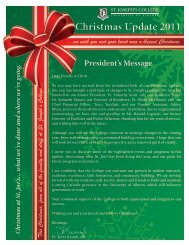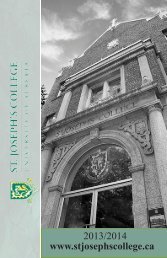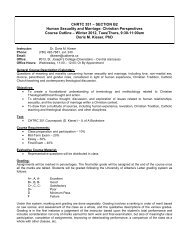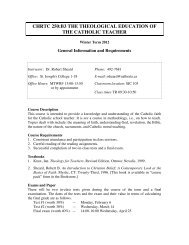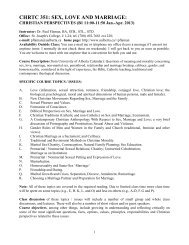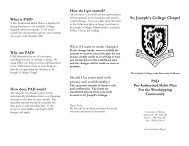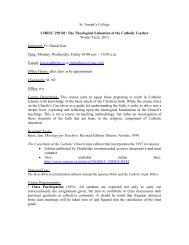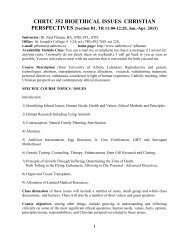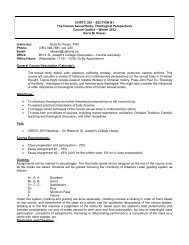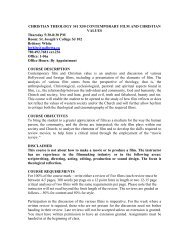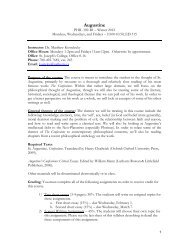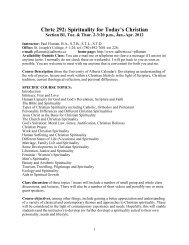phil 339 (x50) - St. Joseph's College - University of Alberta
phil 339 (x50) - St. Joseph's College - University of Alberta
phil 339 (x50) - St. Joseph's College - University of Alberta
Create successful ePaper yourself
Turn your PDF publications into a flip-book with our unique Google optimized e-Paper software.
JA Buijs Phil <strong>339</strong>, 2013 – 2<br />
RESOURCES<br />
Joseph A. Buijs. Worldviews in Conflict and Dialogue. Published for <strong>St</strong>udent Use.<br />
<strong>University</strong> <strong>of</strong> <strong>Alberta</strong>, 2013.<br />
Selected Readings and Resources for Phil <strong>339</strong>. Compiled by Joseph A. Buijs. <strong>University</strong><br />
<strong>of</strong> <strong>Alberta</strong> Custom Courseware, 2013.<br />
Joseph A. Buijs, What is Philosophy? A Guide for the Beginning <strong>St</strong>udent. Published for<br />
<strong>St</strong>udent Use. <strong>University</strong> <strong>of</strong> <strong>Alberta</strong>, 2003.<br />
<strong>St</strong>udents will have access to an eClass site with detailed information on topics,<br />
assignments, marking, additional resources, <strong>of</strong>fice hours, and the like.<br />
EXPECTATIONS (Workload)<br />
In addition to a reflective and critical study <strong>of</strong> required reading material, students will be<br />
expected to complete the following written work:<br />
# Two take-home tests, answering a pre-assigned question<br />
maximum three typed pages; 15% each.<br />
# A critical discussion <strong>of</strong> any selected conceptual framework (religion, ideology,<br />
<strong>phil</strong>osophy, worldview) other than any <strong>of</strong> the six explored in the course<br />
outline: 5%<br />
maximum eight typed pages; 25%<br />
# A final, take-home exam: 40%<br />
Written work is expected to be the student’s own and specifically produced for this course. Any<br />
use <strong>of</strong> resources, whether merely drawing from the views and arguments <strong>of</strong> others or quoting<br />
verbatim, must be properly documented.<br />
“The <strong>University</strong> <strong>of</strong> <strong>Alberta</strong> is committed to the highest standards <strong>of</strong> academic integrity and<br />
honesty. <strong>St</strong>udents are expected to be familiar with these standards regarding academic honesty<br />
and to uphold the policies <strong>of</strong> the <strong>University</strong> in this respect. <strong>St</strong>udents are particularly urged to<br />
familiarize themselves with the provision <strong>of</strong> the Code <strong>of</strong> <strong>St</strong>udent Behaviour (online at<br />
www.ualberta.ca/secretariat/appeals.htm) and avoid any behaviour which could potentially result<br />
in suspicions <strong>of</strong> cheating, plagiarism, misrepresentation <strong>of</strong> facts and/or participation in an<br />
<strong>of</strong>fence. Academic dishonesty is a serious <strong>of</strong>fence and can result in suspension or expulsion from<br />
the <strong>University</strong>.” (<strong>University</strong> Calendar, Addendum Page, June 13, 2012: 23.4 (2)(a)(xii))<br />
“Whether we know it or not--whether we like it or not – each <strong>of</strong> us has a worldview.<br />
These worldviews function as interpretive conceptual schemes to explain why we "see"<br />
the world as we do, why we <strong>of</strong>ten think and act as we do. Competing worldviews <strong>of</strong>ten<br />
come into conflict.”<br />
Ronald H. Nash, Faith and Reason (1988): 33-34



